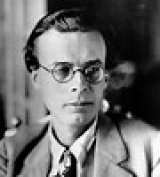In Uncertainty To A Lady
Aldous Leonard Huxley 1894 (Aldous Leonard Huxley Godalming, Surrey) – 1963 (Los Angeles County, California)
Font size:
Submitted on August 03, 2020
Modified on March 20, 2023
- 12 sec read
- 6 Views
Quick analysis:
| Scheme | ABAB CDCD |
|---|---|
| Closest metre | Iambic tetrameter |
| Characters | 224 |
| Words | 43 |
| Stanzas | 2 |
| Stanza Lengths | 4, 4 |
Translation
Find a translation for this poem in other languages:
Select another language:
- - Select -
- 简体中文 (Chinese - Simplified)
- 繁體中文 (Chinese - Traditional)
- Español (Spanish)
- Esperanto (Esperanto)
- 日本語 (Japanese)
- Português (Portuguese)
- Deutsch (German)
- العربية (Arabic)
- Français (French)
- Русский (Russian)
- ಕನ್ನಡ (Kannada)
- 한국어 (Korean)
- עברית (Hebrew)
- Gaeilge (Irish)
- Українська (Ukrainian)
- اردو (Urdu)
- Magyar (Hungarian)
- मानक हिन्दी (Hindi)
- Indonesia (Indonesian)
- Italiano (Italian)
- தமிழ் (Tamil)
- Türkçe (Turkish)
- తెలుగు (Telugu)
- ภาษาไทย (Thai)
- Tiếng Việt (Vietnamese)
- Čeština (Czech)
- Polski (Polish)
- Bahasa Indonesia (Indonesian)
- Românește (Romanian)
- Nederlands (Dutch)
- Ελληνικά (Greek)
- Latinum (Latin)
- Svenska (Swedish)
- Dansk (Danish)
- Suomi (Finnish)
- فارسی (Persian)
- ייִדיש (Yiddish)
- հայերեն (Armenian)
- Norsk (Norwegian)
- English (English)
Citation
Use the citation below to add this poem to your bibliography:
Style:MLAChicagoAPA
"In Uncertainty To A Lady" Poetry.com. STANDS4 LLC, 2024. Web. 20 Apr. 2024. <https://www.poetry.com/poem/54656/in-uncertainty-to-a-lady>.



Discuss the poem In Uncertainty To A Lady with the community...
Report Comment
We're doing our best to make sure our content is useful, accurate and safe.
If by any chance you spot an inappropriate comment while navigating through our website please use this form to let us know, and we'll take care of it shortly.
Attachment
You need to be logged in to favorite.
Log In